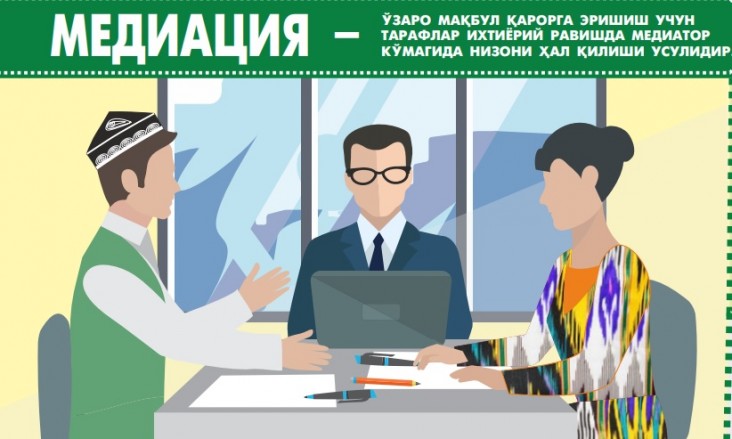Speeches Shim

USAID Introduces Mediation in Uzbekistan
Sayyora and Masud were a Tashkent couple undergoing a difficult divorce. Money, assets and real estate were at stake, but these concerns were second to their worries about how their children would react to the divorce. Knowing that going to court would have painful repercussions for their family, they instead turned to a professional mediator, Ms. Sevara Maripova, to negotiate their settlement.
“Most mediators like myself deal with heated conflicts, helping people resolve their concerns while staying neutral and emotionally uninvolved,” said Ms. Maripova. “We offer less-painful means of resolving conflicts.”
Improving Access to Justice
While Ms. Maripova has trained to be a professional mediator with particular knowledge of divorce law, anyone older than 25 and with no police record can officially mediate a conflict in Uzbekistan. A mediator’s most important skill is being able to resolve arguments from a neutral standing, reaching outcomes that benefit all involved, while staying independent, and keeping all case details in strict confidence.
Mediation practices in Uzbekistan have been established with USAID’s support through the Rule of Law Partnership in Uzbekistan project, in cooperation with UNDP and the Supreme Court of the Republic of Uzbekistan. Uzbekistan’s law on mediation was first created in 2019 with the Rule of Law Partnership project’s assistance, and mediation was subsequently included in the curricula of the Tashkent State University of Law and the University of World Economy and Diplomacy. Training courses have been held for students, professors and practicing legal professionals alike, drawing on the experience and knowledge of national and international experts. Currently, there are three mediators’ associations in Uzbekistan.
While there are of course limits to what mediators can do, such as not being able to perform state functions with the exception of being notaries, their services are diverse and applicable to many legal situations Uzbekistan’s citizens might find themselves in.
Mediators Bridge a Gap in Achieving Justice for All
Today the national electronic justice system speeds judicial processes, free legal clinics eliminate financial barriers to justice, and the COVID-19 pandemic has sped up development of digital options to access legal help. Yet, more often than not, litigation is time-consuming and often turns contentious when lawyers are involved. Mediators are able to resolve personal conflicts with legal certainty, while preventing emotional pain and stress for those involved.
“Individuals and legal entities seek mediation services to resolve civil and business law conflicts, when both parties want to avoid ‘bad blood’,” said Eldor Mahkamov, Head of the Department on Judicial Education and Court Expertise of the Ministry of Justice of Uzbekistan.
“Mediators mostly handle family cases related to divorce, child custody and property division, but they also assist in business cases including contract termination or amendment, loan agreements, purchase and sale leases, customer rights, and other such matters.” added Mr. Mahkamov.
Mediation is an Appealing Alternative
Popularizing mediation as a means of resolving conflict has been a gradual process. Mediation was only established in Uzbekistan at the start of 2019, but the public’s use of mediators has not substantially increased since then, even when the national courts’ review of cases slowed during the COVID-19 pandemic.
“While Uzbekistan’s judiciary has been reformed to make it more of a public service, it is still harder to change the way people generally think about legal assistance,” Mr. Mahkamov explains. “Their first instinct is still to personally submit problems to courts, which they think is the only way of resolving conflicts.”
Additionally, raising awareness about mediation services is important and could be done through advertising, social media, and traditional media, perhaps using stories of cases where legal problems have been resolved through mediation. Word of mouth may also play a role in this process. Getting people to not only use mediation services but also become mediators themselves can be achieved by appealing to the interconnectedness of Uzbekistan’s culture.
“Uzbekistan’s unique ‘Hashar’ practice, or community volunteering, is born from close bonds between family, friends and neighbors, and our need to help each-other. Mediating done professionally or just by someone considered a natural negotiator, can be part of that tradition,” Mr. Mahkamov adds. “It takes responsibility to be a mediator, but personal satisfaction from the job can be immense.”
Win-Win Outcomes
By applying her expertise, Ms. Maripova helped Sayyora and Masud reach a resolution that was agreeable to both of them and their children. It was decided that Sayyora would own two of the couple’s three properties and one of their two businesses, while receiving the equivalent of $2,500 in alimony, while Masud retained the rest of their considerable assets and real estate, and maintained unrestricted access to their children.
“This was a difficult case with hurt feelings involved, but I got us to a place where no one felt they were the ‘loser’,” Ms. Maripova said. “When it works out this way, I really love my job.”
(Sayyora and Masud’s names have been changed to protect their privacy)

Comment
Make a general inquiry or suggest an improvement.